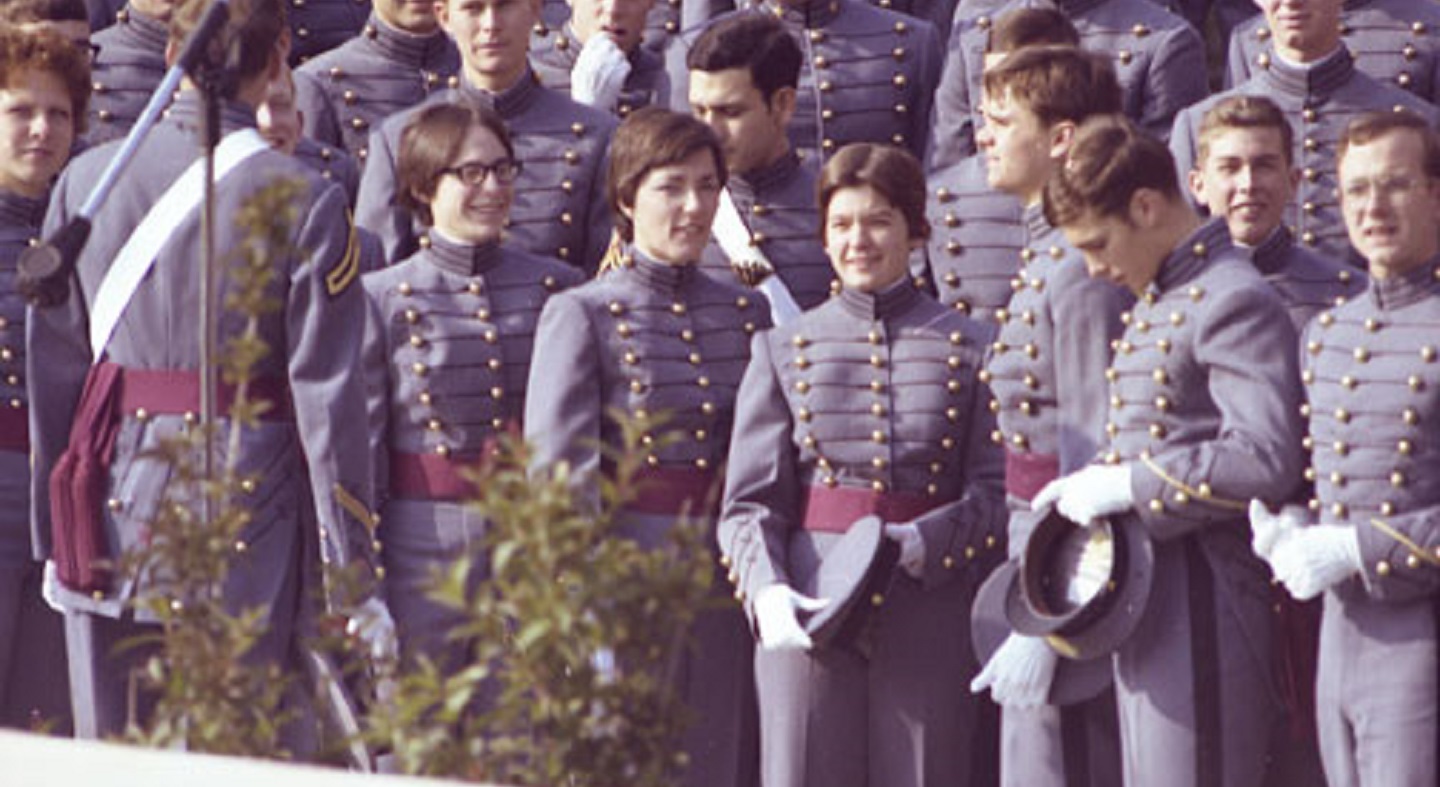
HISTORICALLY WE WANT THEM TO BE ABLE TO… READ ABOUT ANOTHER CULTURE, READ ABOUT THEIR HISTORY, THEIR ETHICAL DEVELOPMENT AND TO UNDERSTAND WHY A CULTURE DEVELOPED THE WAY THAT IT DID
In a world that is dominated by discussions of artificial intelligence, increasing technology on the battlefield, and new domains in space and cyber, what part does history play in the development of today’s military officer. Dr. Greta Bucher, Professor of History at the United States Military Academy, joins our Editor-in-Chief Jacqueline Whitt to discuss how an education in history is just as relevant today as it was a hundred years ago. But what should a historical education look like? Bucher and Whitt discuss the importance of incorporating social and cultural history, especially related to questions about race and gender, in the education of future military officers.
Podcast: Download
Dr. Greta Bucher is a Professor of History and the Vice-Deputy for Academic Affairs in the History Department at West Point Military Academy. Jacqueline E. Whitt is an Associate Professor of Strategy at the U.S. Army War College and the Editor-in-Chief of WAR ROOM. The views expressed in this presentation are those of the speakers and do not necessarily reflect those of the U.S. Army War College, U.S. Army, or Department of Defense.
Photo Description: In 1976, 119 female cadets, a few of them seen here with their male counterparts, became the first women to join the Corps of Cadets at The United States Military Academy at West Point. Of the original 119, 62 graduated in 1980.
Photo Credit: Department of the Army





In my opinion, the two professors should be deployed as infantry platoon leaders to a combat zone where they should demonstrate that the lessons taught at the USMA in race and gender can be translated into practical actions. They should have a standard deployment of a year in hot combat.
In my opinion, the USMA curriculum and teaching materials on race and gender should have a thorough review and / or audit by the National Association of Scholars.
In my opinion, the USMA curriculum and teaching materials on race and gender should have a thorough review by Heterodox Academy separately.
In my opinion, we have the following articles which would make a starting point for review of the curriculum and teaching materials.
While the two professors make much of the issue of slavery and civil rights, I must have missed the history lesson where slave ships delivered Africans to the Tinglit Tribe of Alaska during the time when Alaska was controlled by the Czar in Russia.
As Montgomery McFate points out, Anthropology is not an actual science at this time. The logic escapes me of how you can cite the social sciences as informing the students if the social science cited is not a science with lessons to teach?
One wonders whether the history professors know how to add other perspectives and analysis into the students lessons besides race and gender?
Scale: The Universal Laws of Growth, Innovation, Sustainability, and the Pace of Life in Organisms, Cities, Economies, and Companies
https://www.santafe.edu/news-center/news/geoffrey-wests-long-anticipated-book-scale-emerges
The Most Authoritative Review Paper on Gender Differences
https://heterodoxacademy.org/the-most-authoritative-review-paper-on-gender-differences/
As we saw with the Arab Spring, we can have emergent behaviors which can’t be predicted.
Also, the students would benefit from knowing which standard techniques will not change behavior and what methods might change behavior.
How Behavior Spreads: The Science of Complex Contagions by Damon Centola
https://ndg.asc.upenn.edu/book/how-behavior-spreads-the-science-of-complex-contagions/
The Science On Male And Female Brains Helps Explain Why Women Don’t Choose Tech Careers
https://thefederalist.com/2018/04/12/science-male-female-brains-helps-explain-women-dont-choose-tech-careers/
The technical details are always important in devising sound policies. Sound policies make for better grand strategies.
He Who Is Without Zinn: Review of ‘Land of Hope: An Invitation to the Great American Story’ By Wilfred M. McClay
https://www.commentarymagazine.com/articles/he-who-is-without-zinn/
GettingTribes: A Corrective by ANNA SIMONS What Americans misunderstand about tribal cultures, and how it hurts U.S. foreign policy
https://faculty.nps.edu/asimons/docs/Getting%20Tribes_%20A%20Corrective%20-%20The%20American%20Interest.pdf
The Genomic Challenge to the Social Construction of Race by Jiannbin Lee Shiao, Thomas Bode, Amber Beyer, …
First Published June 18, 2012 Research Article
https://doi.org/10.1177/0735275112448053
Article information
Article has an altmetric score of 39 No Access
Abstract
Recent research on the human genome challenges the basic assumption that human races have no biological basis. In this article, we provide a theoretical synthesis that accepts the existence of genetic clusters consistent with certain racial classifications as well as the validity of the genomic research that has identified the clusters, without diminishing the social character of their context, meaning, production, or consequences. The first part of this article describes the social constructionist account of race as lacking biological reality, its main shortcomings, and our proposed solution: the concept of clinal classes. The second part discusses the character of the group differences that would be consistent with clinal classes and introduces the concept of genomic individualism, which extends an emerging model for understanding biosocial causation to include the genetic effects of ancestry. The third part develops the argument for a “bounded nature” reformulation of racial constructionism that reconceptualizes racial and ethnic categorization as the social perception of ancestry. The final part summarizes the article’s contributions and outlines implications for future research.
https://journals.sagepub.com/doi/abs/10.1177/0735275112448053
Race and Economics: How Much Can We Blame on Discrimination? by Walter E. Williams
World Ranking of Countries by Average IQ
https://brainstats.com/average-iq-by-country.html
Data from: Intrinsic honesty and the prevalence of rule violations across societies by Gächter, Simon Schulz, Jonathan F. Publication date: February 4, 2017
https://datadryad.org/stash/dataset/doi:10.5061/dryad.9k358
Military Anthropology: Soldiers, Scholars and Subjects at the Margins of Empire by Montgomery McFate
In almost every military intervention in its history, the US has made cultural mistakes that hindered attainment of its policy goals. From the strategic bombing of Vietnam to the accidental burning of the Koran in Afghanistan, it has blundered around with little consideration of local cultural beliefs and for the long-term effects on the host nation’s society. Cultural anthropology–the so-called “handmaiden of colonialism”–has historically served as an intellectual bridge between Western powers and local nationals. What light can it shed on the intersection of the US military and foreign societies today?
This book tells the story of anthropologists who worked directly for the military, such as Ursula Graham Bower, the only woman to hold a British combat command during WWII. Each faced challenges including the negative outcomes of exporting Western political models and errors of perception.
Ranging from the British colonial era in Africa to the recent wars in Iraq and Afghanistan, Military Anthropology illustrates the conceptual, cultural and practical barriers encountered by military organisations operating in societies vastly different from their own.
Center for Military Readiness
https://cmrlink.org/
Aboriginal Slavery On The Northwest Coast Of North America Book Pdf
March 15, 2018
https://basertuper.wixsite.com/tippclosuran/single-post/2018/03/16/Aboriginal-Slavery-On-The-Northwest-Coast-Of-North-America-Book-Pdf
I think that the USMA should review the curriculum and teaching materials with these resources used to evaluate the validity of the teaching material.
The National Academies of Sciences, Engineering and Medicine
U.S. Scientific Research Enterprise Should Take Action to Protect Integrity in Research; New Advisory Board on Research Integrity Should Be Established
WASHINGTON – All stakeholders in the scientific research enterprise — researchers, institutions, publishers, funders, scientific societies, and federal agencies – should improve their practices and policies to respond to threats to the integrity of research, says a new report from the National Academies of Sciences, Engineering, and Medicine. Actions are needed to ensure the availability of data necessary for reproducing research, clarify authorship standards, protect whistleblowers, and make sure that negative as well as positive research findings are reported, among other steps.
The report stresses the important role played by institutions and environments – not only individual researchers — in supporting scientific integrity. And it recommends the establishment of an independent, nonprofit Research Integrity Advisory Board to support ongoing efforts to strengthen research integrity. The board should work with all stakeholders in the research enterprise to share expertise and approaches for minimizing and addressing research misconduct and detrimental practices.
“The research enterprise is not broken, but it faces significant challenges in creating the conditions needed to foster and sustain the highest standards of integrity,” said Robert Nerem, chair of the committee that wrote the report, and Institute Professor and Parker H. Petit Professor Emeritus, Institute for Bioengineering and Bioscience, Georgia Institute of Technology. “To meet these challenges, all parties in the research enterprise need to take deliberate steps to strengthen the self-correcting mechanisms that are part of research and to better align the realities of research with its values and ideals.”
A growing body of evidence indicates that substantial percentages of published results in some fields are not reproducible, the report says, noting that this is a complex phenomenon and much remains to be learned. While a certain level of irreproducibility due to unknown variables or errors is a normal part of research, data falsification and detrimental research practices — such as inappropriate use of statistics or after-the-fact fitting of hypotheses to previously collected data — apparently also play a role. In addition, new forms of detrimental research practices are appearing, such as predatory journals that do little or no editorial review or quality control of papers while charging authors substantial fees. And the number of retractions of journal articles has increased, with a significant percentage of those retractions due to research misconduct. The report cautions, however, that this increase does not necessarily indicate that the incidence of misconduct is increasing, as more-vigilant scrutiny by the community may be a contributing factor.
The report endorses the definition of scientific misconduct proposed in the 1992 Academies report Responsible Science: “fabrication, falsification, or plagiarism in proposing, performing, or reporting research.” However, many practices that have until now been categorized as “questionable” research practices – for example, misleading use of statistics that falls short of falsification, and failure to retain research data — should be recognized as “detrimental” research practices, the new report says.
http://www8.nationalacademies.org/onpinews/newsitem.aspx?RecordID=21896&utm_source=NASEM+News+and+Publications&utm_campaign=15d988f9b6-NAP_mail_new_2017.04.17&utm_medium=email&utm_term=0_96101de015-15d988f9b6-104332205&goal=0_96101de015-15d988f9b6-104332205&mc_cid=15d988f9b6&mc_eid=0f163c1e89
The Irreproducibility Crisis of Modern Science: Causes, Consequences, and the Road to Reform
A reproducibility crisis afflicts a wide range of scientific and social-scientific disciplines, from epidemiology to social psychology. Many supposedly scientific results cannot be reproduced, because of improper use of statistics, arbitrary research techniques, lack of accountability, political groupthink, and a scientific culture biased toward producing positive results. The report includes a series of policy recommendations, scientific and political, for alleviating the reproducibility crisis.
https://nas.org/reports/the-irreproducibility-crisis-of-modern-science
The Chronicles of Higher Education
‘I Want to Burn Things to the Ground’
Are the foot soldiers behind psychology’s replication crisis saving science — or destroying it?
By Tom Bartlett September 11, 2018 Premium content for subscribers. Subscribe Today
Are the foot soldiers behind psychology’s replication crisis saving science — or destroying it?
https://www.chronicle.com/article/I-Want-to-Burn-Things-to/244488?key=ONA-J8qTe05O7njbTd0tJxVPc8Wh8rPZLgfV3j9qtQvPw_NSaQoPLX5LOtOxfok8TDJSbDZYakViRTN1RW9qdjFKT1BZUUJTc3dBUjM0N1AyRlFJV2dnVzEyQQ
I think that the race and gender curriculum and teaching materials should be reviewed for these potential flaws.
The National Academies of Sciences, Engineering and Medicine
U.S. Scientific Research Enterprise Should Take Action to Protect Integrity in Research; New Advisory Board on Research Integrity Should Be Established
WASHINGTON – All stakeholders in the scientific research enterprise — researchers, institutions, publishers, funders, scientific societies, and federal agencies – should improve their practices and policies to respond to threats to the integrity of research, says a new report from the National Academies of Sciences, Engineering, and Medicine. Actions are needed to ensure the availability of data necessary for reproducing research, clarify authorship standards, protect whistleblowers, and make sure that negative as well as positive research findings are reported, among other steps.
The report stresses the important role played by institutions and environments – not only individual researchers — in supporting scientific integrity. And it recommends the establishment of an independent, nonprofit Research Integrity Advisory Board to support ongoing efforts to strengthen research integrity. The board should work with all stakeholders in the research enterprise to share expertise and approaches for minimizing and addressing research misconduct and detrimental practices.
“The research enterprise is not broken, but it faces significant challenges in creating the conditions needed to foster and sustain the highest standards of integrity,” said Robert Nerem, chair of the committee that wrote the report, and Institute Professor and Parker H. Petit Professor Emeritus, Institute for Bioengineering and Bioscience, Georgia Institute of Technology. “To meet these challenges, all parties in the research enterprise need to take deliberate steps to strengthen the self-correcting mechanisms that are part of research and to better align the realities of research with its values and ideals.”
A growing body of evidence indicates that substantial percentages of published results in some fields are not reproducible, the report says, noting that this is a complex phenomenon and much remains to be learned. While a certain level of irreproducibility due to unknown variables or errors is a normal part of research, data falsification and detrimental research practices — such as inappropriate use of statistics or after-the-fact fitting of hypotheses to previously collected data — apparently also play a role. In addition, new forms of detrimental research practices are appearing, such as predatory journals that do little or no editorial review or quality control of papers while charging authors substantial fees. And the number of retractions of journal articles has increased, with a significant percentage of those retractions due to research misconduct. The report cautions, however, that this increase does not necessarily indicate that the incidence of misconduct is increasing, as more-vigilant scrutiny by the community may be a contributing factor.
The report endorses the definition of scientific misconduct proposed in the 1992 Academies report Responsible Science: “fabrication, falsification, or plagiarism in proposing, performing, or reporting research.” However, many practices that have until now been categorized as “questionable” research practices – for example, misleading use of statistics that falls short of falsification, and failure to retain research data — should be recognized as “detrimental” research practices, the new report says.
http://www8.nationalacademies.org/onpinews/newsitem.aspx?RecordID=21896&utm_source=NASEM+News+and+Publications&utm_campaign=15d988f9b6-NAP_mail_new_2017.04.17&utm_medium=email&utm_term=0_96101de015-15d988f9b6-104332205&goal=0_96101de015-15d988f9b6-104332205&mc_cid=15d988f9b6&mc_eid=0f163c1e89
The Irreproducibility Crisis of Modern Science: Causes, Consequences, and the Road to Reform
A reproducibility crisis afflicts a wide range of scientific and social-scientific disciplines, from epidemiology to social psychology. Many supposedly scientific results cannot be reproduced, because of improper use of statistics, arbitrary research techniques, lack of accountability, political groupthink, and a scientific culture biased toward producing positive results. The report includes a series of policy recommendations, scientific and political, for alleviating the reproducibility crisis.
https://nas.org/reports/the-irreproducibility-crisis-of-modern-science
The Chronicles of Higher Education
‘I Want to Burn Things to the Ground’
Are the foot soldiers behind psychology’s replication crisis saving science — or destroying it?
By Tom Bartlett September 11, 2018 Premium content for subscribers. Subscribe Today
Are the foot soldiers behind psychology’s replication crisis saving science — or destroying it?
https://www.chronicle.com/article/I-Want-to-Burn-Things-to/244488?key=ONA-J8qTe05O7njbTd0tJxVPc8Wh8rPZLgfV3j9qtQvPw_NSaQoPLX5LOtOxfok8TDJSbDZYakViRTN1RW9qdjFKT1BZUUJTc3dBUjM0N1AyRlFJV2dnVzEyQQ